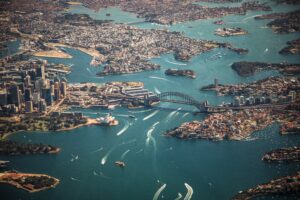
Australian marine industry grapples with staffing issues and supply

Global Marine Business Advisors Australia representative Maryanne Edwards highlights the challenges and potential wins facing the Australian marine industry.
Australia’s inflation, like many other countries around the globe is a result of the knock-on effects from the covid pandemic, the war in Ukraine and strong consumer demand. The economic recovery from the global recession caused by covid lockdowns has been stronger than expected, which is partly due to the government providing long-term emergency stimulus packages.
Boat sales are still healthy despite the expectations of higher interest rates. Sales certainly have not dropped off as some feared. There are some indications it has plateaued slightly but the general opinion from brokers is it is still buoyant. Demand remains above the pre-covid period and while consumers may wish to ponder boat buying decisions – given interest rate hikes and inflation – those who do not buy now know they are in for even lengthier lead times.
The ability to attract and retain staff is a major issue for the entire Australian marine industry. With strong demand in new building and repair & service, employees are jumping from one business to another for a few more dollars. A recent national government jobs summit has endeavoured to address a number of issues particularly the skilled workers’ visas.
Strong orders, staff shortages, the difficulties in supply of raw materials, cost of shipping and shipping delays are being managed by most boatbuilders and equipment manufacturers. Manufacturers are working closely with their suppliers to reduce disruptions with forward orders and buffer stocks. As in many countries delays and price hikes are being experienced and given the unknowns, it is often hard to commit to supply delivery dates or any fixed pricing agreements.

Looking ahead, energy and fuel costs will continue to be an issue for some time and with continued interest hikes, cost of living escalations, the Ukraine war, and other economic factors – inflation is certainly going to touch many aspects of the Australian marine industry.
Given the distance from many global markets, the cost of transport is a key issue faced by exporters and importers in Australia. Global transport costs are up 30—50 per cent and some are also saying availability is also low.
On a positive note, the charter market in the Pacific is extremely busy, with David Good, CEO Superyacht Australia, commenting that “there are probably not enough vessels for the demand at the moment”. Given the war in Ukraine and the post-covid environment, a number of superyacht owners are focused on heading to the Pacific. There has been considerable investment in infrastructure and services in Australia, so the Australian industry is well placed to look after and service the growth in demand by the global superyacht fleet.
While boat shows are reporting increasing numbers, some people are too busy to travel, and with escalating travel costs and continued concern over travel disruptions most companies are still receiving strong orders without attending boat shows. Shipping costs from Australia and the costs associated with exhibiting boats make boat shows a very expensive branding exercise. The current demand has taken the pressure off shows as a primary selling function in established markets and some boatbuilders are preferring smaller targeted events.
Global Marine Business Advisors is a group of 19 experienced marine industry professionals, located in nineteen countries on five continents. The key focus for GMBA is to provide support for marine industry businesses across a variety of disciplines and sectors.
